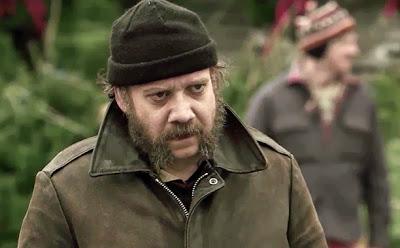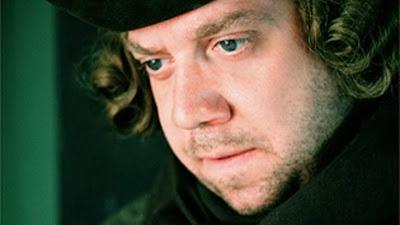
Paul Giamatti Moves Into the Bright
By
Alex Simon
Actor Paul Giamatti has become one of the most visible character actors of his generation since his breakout role in 1997’s Private Parts, opposite radio icon Howard Stern. Since then, Giamatti has appeared in over eighty films and television productions, has been nominated for 45 separate awards between 2001 and 2008, and won 26 of them, including both an Emmy and a Golden Globe for the titular role in HBO’s John Adams.
Paul Giamatti has two new films opening this weekend: All is Bright, from Anchor Bay Films, has Giamatti portraying ex-con Dennis who joins forces with his former best friend (Paul Rudd) to travel from their native Quebec to New York to sell Christmas trees for the holiday season. A picaresque road trip ensues with truths and reconciliations abounding. The film also stars Sally Hawkins, Amy Landecker and was directed by Phil Morrison.
Also hitting theaters is Parkland, from Playtone and Exclusive Media Group, about the people surrounding the seismic events of the JFK assassination in Dallas. Giamatti plays Abraham Zapruder, who filmed the now-legendary footage of Kennedy’s murder.
Paul Giamatti spoke with us recently about these films and others in his canon. Here’s what transpired:
All is Bright was obviously a labor of love, as both you and your wife are producers on it.
Paul Giamatti: I have a production company I formed with my wife and a buddy of mine. We’ve produced four movies so far and, I won’t lie to you, it’s hell on earth making these little movies. It’s like pushing three giant rocks up a hill. (laughs) I get these people who have a great story they want to tell and I want to help them get their movie made, but boy, is it hard. (laughs) The script was written by Melissa James Gibson, who’s a friend of ours, and a renowned Canadian playwright. The script was originally very quirky and almost surreal, then she worked on it to make it more grounded and realistic. So I really wanted to see this friend of mine get her movie made.
I kept thinking of two of my favorite ‘70s movies, both from ’73, while I was watching this: Scarecrow and The Last Detail.
Yeah, I know what you mean. Scarecrow, man, that’s a great movie, that’s an intense movie. I think the sensibility is right. Also a movie I kept thinking of was a film Robert Altman did called California Split. For some reason, this movie reminded me of that one, and I’m not sure why.
Well, all four of these movies are essentially road pictures about itinerant people who are on the fringes of society.
Yeah, you’re right. King of Marvin Gardens is another one that I love which would fall into that category, certainly in the style it’s shot it, with all the gritty detail. Somebody said to me “Why are these guys so dirty?” And I said, ‘Because they don’t have a shower!’ (laughs) They’re getting sap and mud all over them all day long. But yeah, all those movies have been hugely influential on me, especially The Last Detail. That’s such a great movie.
One thing I noticed about your character, Dennis, as with a lot of the characters you’ve played, is that in the wrong hands, he would’ve been really unlikable, a real schmuck, but somehow you managed to find his humanity.
The word you just used is more important than “likable.” To me “sympathetic” is far more important than “likable.”
And maybe an even more important quality from an audience’s point-of-view than sympathetic would be empathetic.
Yeah, and that has nothing to do with likability. That tramps on all of that. I hear you. “Likable” is a word people use a lot now and I’m not that interested in it.
“Likable” has contributed to the dumbing down of movies and most popular culture over the past twenty-five years, in my opinion.
I agree, actually.
When you look at a new part, do you have to find the humanity in that part to want to play it?
I think I probably just think they are to begin with. It’s funny, somebody said “Dennis is so misanthropic,” and I never saw him that way. I saw a guy who was closed off because he has to be. He had been in prison and a guy like him is gonna get fucking killed in prison, so of course he’s shut off. That doesn’t make him misanthropic. It just makes him a guy who’s guarded because he’s got to be. So it never even occurred to me whether this guy would be sympathetic or not, and it really never does when I’m looking at a part. But I guess I look at a guy like that and think ‘Sure, he’s got a lot of humanity in him. He’s gone through a lot of crap.’ Just that fact that he doesn’t kill the Paul Rudd character right away says something about him.
So it sounds like choosing a part is a more intuitive process for you.
Yeah, I think so. Definitely.
How was your experience at Yale?
I had a great time there. I grew up in New Haven, around the university and a part of me has a deep, abiding affection for that place, and always will. My dad was an academic and really instilled a love of knowledge and learning in me. It was a wonderful place to go to school. It was a terrific environment to grow up in, being in an academic household. I think there are a lot of negative preconceived notions about it, which I find to be untrue.
What was the legendary drama program there like?
I originally thought I would be strictly a stage actor, which is what Yale is renowned for, and I figured if that was what I was going to do with my life, I couldn’t do any better than Yale. We learned all the technical stuff, which was invaluable. Also it’s an environment where you get to do amazing things that you’ll never get to do again.
 Giamatti as John Adams.
Giamatti as John Adams. I have to admit that I never thought anyone could challenge the mantle of William Daniels in the role of John Adams, but I thought your interpretation was phenomenal.
(laughs) I think a lot of people preferred William Daniels. When they brought the script to me I read it and thought it was terrific, but I said ‘You really want to make a nine-hour movie about this guy who’s a relentless pain in the ass?’ (laughs) So I said I’d love to do it, but that I wasn’t going to compromise about him being a pain in the ass, because I thought that would be really interesting.
What was it you felt that made Adams tick?
There were so many different aspects to him. He was endlessly complex. I suppose his dissatisfaction with life propelled him a great deal. He was a deeply dissatisfied person. I think a lot of that contributed to his power. I don’t think somebody who was settled in the world could have done what he did. He basically was a guy who was driven by this intense intellect. He was an intense intellectual first and a politician second. Actually, he was a terrible politician. (laughs) He was more of a political philosopher, which is what he should have focused on. If I had to choose one thing, I’d say it was his incredible insecurity which drove him, but that’s a tough one.
Coming up you’ve also got Parkland, set around the JFK assassination, where you play Abraham Zapruder, who filmed the legendary home movie of Kennedy’s murder in Dallas.
It was an interesting script. It attempts to tell you the event from within the event as it’s unfolding. It’s told from the point of view of these ancillary characters that were crucial to the event, but managed to remain anonymous. It takes a look at all the human fallout that resulted for those who were witness to the assassination, both in Dealy Plaza and at Parkland Hospital, where they brought JFK after the shooting.
Tell us about Zapruder, and what you discovered about him.
I knew nothing about him prior to this. I didn’t know that he was a Ukrainian Jew who came over when he was about ten, to escape the pogrom. He learned English, was a self-made businessman in Manhattan, and then ended up in Dallas on November 22, 1963. It’s a fascinating story. He was, by all accounts, a really sweet, ebullient, decent man. And shooting that film really destroyed his life. He felt guilty about it. I think he felt complicit somehow that he gave the world this horrific document. He died not too long after. I think it killed him.
